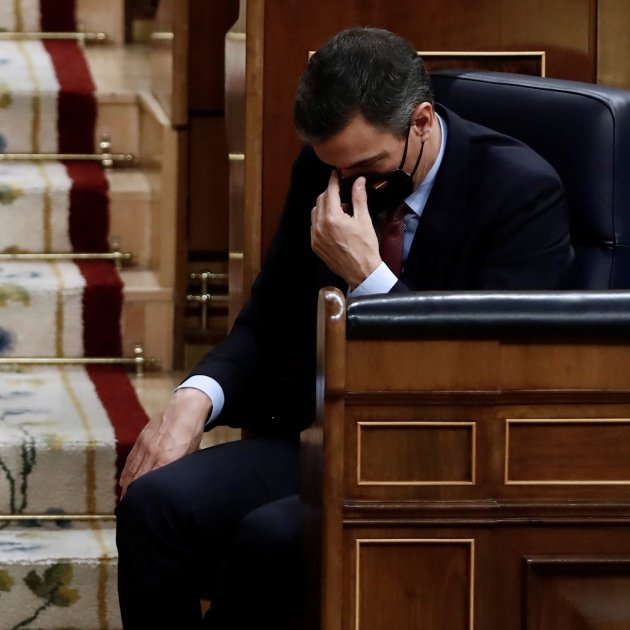The famous 'Illa effect' had an expiry date: February 14th, 2021. Catalans went to decide at the polls and they awarded Salvador Illa's Catalan Socialists (PSC) a draw in seats with the Republican Left (ERC). Not even a win: a draw. The only consolation prize was the moral victory of having come first in the percentage of vote won. In the brain of Socialist guru Iván Redondo, present yesterday alongside Illa, it was a brilliant idea: to repeat the feat of Inés Arrimadas, when she won with 36 deputies in 2017. In fact, in his sweepstake on the election results on radio station RAC1, the Socialist candidate said he'd win 35, followed by Junts with 31. It was not to be. Salvador Illa will not govern.
But in Madrid's Moncloa palace, they have already processed the result and moved on: ERC's Pere Aragonès will be president - if the pro-independence parties do not trip themselves up - and Salvador Illa will be the leader of the opposition. On election night in Calle Ferraz, the top brass of the PSOE had already assumed that this would be the new chess board of Catalan politics, especially after the pro-independence majority in Parliament had grown and ERC had certified in writing that there would be no tripartite deal with the Socialists, the great phantom which had haunted the pro-independence party. Illa's promises today to attempt an investiture vote are nothing more than a play for the gallery (and unless Junts and ERC fall into discord, the speaker of the Catalan Parliament, with the final say on who stands for president, will continue to be pro-independence). ERC has been reinforced and the PSOE has once again lost control of Catalonia and its leading institution. At the most, they aspire for the Comuns to sneak into the Catalan cabinet photo, but that doesn’t seem very likely either.
The failed bet has a cost. This scenario was not the worst feared by Pedro Sánchez's PSOE. That would have been a victory by Laura Borràs in the pro-independence camp, more prone to "confrontation" with the Spanish state. But the reality is far from the ideal scenario envisaged, which consisted of a solid victory for Illa which was enough to blow apart the dynamics of the blocs. That hasn’t happened. In this context, ERC has the upper hand, and it also holds a key to the stability of the Spanish government. During the pre-campaign, the party already sent a storm warning in the Congress of Deputies, when it rejected the decree on management of the European Covid-19 funds for being centralist and vague. Paradoxically, the Spanish government had to resort to abstentions from far-right Vox in order to pass the decree and not suffer a resounding setback.
ERC has the upper hand, and also holds a key to the stability of the Spanish government
The bill that ERC will now want to be paid in full was already made clear by Pere Aragonès at the end of Sunday night's vote count: the release of the political prisoners and a dialogue table to really face the political conflict. They want the returns they haven’t had up till now. ERC is privately committed to pushing for pardons for the political prisoners, provided it is done with the utmost discretion and the least possible ambient noise, from both the right and the independence movement. It also has the commitment, voted in Congress, to return to the Catalonia-Spain dialogue table as soon as there is a new Catalan administration. A year ago the table met for the first and last time, an unkept promise that weighs heavily. Now at ERC they have adopted the old line of ex-Socialist president José Montilla: deeds, not words. Spanish stability requires Catalan stability. Judicial appeals such as today's against the prisoners' leave status by the public prosecutors - who depend on Sánchez, as he once reminded voters - only complicate matters.
This very Tuesday, ERC's Madrid leader Gabriel Rufián will be putting the pressure on a little more in the Congress of Deputies. Just two days after the elections, an ERC motion will be debated, which textually urges the government to "negotiate a referendum on self-determination with the government of the Generalitat de Catalunya as an agreed and democratic solution to the political conflict." The result is predictable: it will not win because the Socialists will vote against it. But it may serve to further strain the seams of the Spanish government coalition if Podemos is consistent with its recent utterances on the Catalan conflict. The party of Pablo Iglesias admits that it has not yet set its position, just hours before the debate in the Spanish Parliament.
Sunday's elections have closed an electoral cycle for the whole of the Spanish state. Pedro Sánchez now has two years free of any kind of election distraction. In Madrid there had been speculation about a possible early general election if the wind was blowing in favour of the Socialists. But Podemos's performance in Catalonia has reversed the trend in the Basque Country and Galicia. Instead, the alternative, which Ciudadanos could have represented, goes from debacle to debacle. Today, the Moncloa has no reason to knock over the complex balancing act of the current Spanish legislature.
